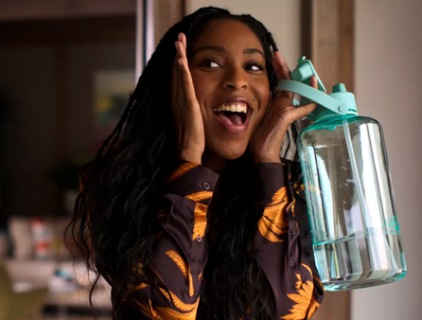How Reusables Flip the Script on Plastics
Guest Author | 21 July 2023
TV’s Newest Star: The “Emotional Support Water Bottle”
By Plastic Pollution Coalition
Television and movie screens have been awash with single-use plastics for decades. From red plastic cups and plastic straws to single-use plastic water bottles and coffee cups, plastic pollution sneaks into the scene across all forms of popular media (and more often than not, it’s intentionally placed there for marketing purposes). In fact, according to a study by the USC Annenberg Norman Lear Center in 2021, the average TV show in the United States features 23 single-use items per episode.
Plastic Pollution Coalition is a nonprofit communications and advocacy organization working to turn off the plastic tap and Flip the Script on Plastics in TV and film. Increasingly, TV shows and films are featuring more reusable alternatives, some going so far as to make them integral to character and storyline development.
One such show is the AppleTV+ original Shrinking, a comedy that premiered earlier this year on the streaming platform, starring Jason Siegal, Harrison Ford, Jessica Williams, and, as many fans have noticed, Jessica Williams’ iconic “emotional support water bottle.”
In the show, Jessica William’s character Gabby is frequently seen carrying a 1-gallon reusable water bottle with her. Throughout the series, Gabby’s water bottle remains by her side, accumulating stickers and personalization with each episode, almost becoming a sidekick character in its own right. Additionally, with the introduction of a smaller version of her water bottle in the pilot episode, we see how this reusable item helps to tell a visual story about the relationship between Gabby and her boss Paul, played by Harrison Ford.
The Los Angeles Times went so far as to call the bottles the “the unlikeliest breakout stars of Shrinking” and asked show co-creator Bill Lawrance to explain how this was inspired:
“We got obsessive about it. And writers’ rooms, they’re full of room bits. And one of the [executive producers] on the show, Annie Mebane, has a water bottle that, when she put it on the table, I couldn’t really see her around it… Jessica immediately was like, “I’m carrying that water bottle everywhere,” and you sometimes even spot it in scenes that you don’t know it’s in. And Harrison was like, “Well, once I get that water bottle, that’s going everywhere with me.” That’s the attention to detail.” – Bill Lawrance, Co-creator of Shrinking in the Los Angeles Times
Water bottles on our screens
While the reusable water bottles in Shrinking were not necessarily added with the intention of calling for more sustainability on screen, they do reflect the emergence of the “emotional support water bottle” trend, particularly among Gen Zers and Millennials, in popular shows and on social media.
The “emotional support water bottle” digital phenomenon sheds light on how water bottles can provide a sense of comfort and support as folks go along their day, sipping on refreshing water from a familiar (and sustainable) container. Carrying around a reusable water bottle not only promotes a healthy lifestyle, it also eases one’s mental health by allowing them to creatively express themselves through the selection of their bottle and how they may choose to decorate it.
This idea of the “emotional support water bottle” has even been observed in the sports realm. A prominent example is professional golfer Rickie Fowler. His reusable Yeti bottle, decked out in meaningful stickers, has garnered attention from fans and press alike, with Fowler explaining, “I started carrying it at the beginning of this year. I drink more if I’m carrying it, and it’s also heavy when it’s full, so I don’t want to necessarily throw that on Rick [Romano], my caddie, to tote that thing around.”
While this trend can sometimes skew towards an unsustainable model from brands that encourages individuals to constantly purchase the newest, coolest bottle, it cannot be ignored that these bottles’ prominence in popular culture helps give viewers a sense of realism, and reflect the small, but mighty, sustainability steps they’ve taken in their own lives.
The water bottle in Shrinking also shows us that reusables can be a great tool for screenwriters. Establishing a key item that’s connected to a character, like Gabby’s water bottle, gives the audience a visual stand-in for Jessica Williams herself, helping the writers follow one of the most important rules of scriptwriting: show, don’t tell.
While U.S. TV writers are currently on strike, we hope that this recent trend towards featuring reusables on screen gains more momentum when they return to work, and that TV shows and films around the globe pick up on the trend and work to Flip the Script on Plastics both on screen, and behind the scenes.
Learn More and Get Involved
Learn more about Flip the Script on Plastics initiative helping the entertainment industry model real solutions to the plastic pollution crisis, both on set and in storylines. If you are interested in getting involved, please contact Amelia@plasticpollutioncoalition.org
Author Bio: Plastic Pollution Coalition is a non-profit communications and advocacy organization that collaborates with an expansive global alliance of organizations, businesses, and individuals to create a more just, equitable, regenerative world free of plastic pollution and its toxic impacts.



